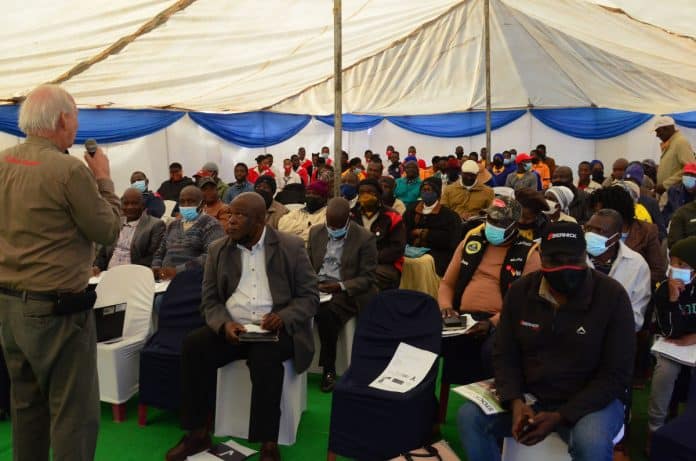Estimated reading time: 4 minutes
During a recent large gathering of black cattle farmers in the Blouberg area in Limpopo they heard how they can empower themselves, give hope to their communities and contribute to food security by utilising more scientific methods. The large number of farmers that attended the meeting was a good indication of their willingness and enthusiasm to embrace science.
The main goal of the farmer’s day was to explore the possibility of forming a partnership with the well-known Sernick Group to help with the development of the producers, their beef cattle herds and managing their environment.
Knowledge is key
In her welcoming address the mayor of the region, Maria Thamaga, asked everyone to thank farmers for putting food on their tables. She thanked Sernick and the speakers for sharing knowledge which is vital to establish a viable cattle herd in the area.
“Many of our farmers do not have the knowledge to exploit the full potential of their cattle. My people must learn to sell their cattle and use the money to improve the genetic potential of their herds,” she said.
Embracing the value chain
Petro Naudé, managing director of farmer development at SerDev, which is part of Sernick Group, explained that their farmer development implementation company has successfully worked with over 700 individual farmers over the past five years. Sernick has partnered with both the Jobs Fund and Absa in bringing these programmes to farmers.
Read more about another successful farmer’s day.
The Free State-based Sernick Group has 40 years of experience in Bonsmara farming under its belt, and embraces the entire value chain – from farm to fork. The enterprise includes stud and commercial farms, a feedlot, feed factory, abattoir, retail butcher shops, and a phase C bull testing centre.
The Sernick emerging farmers’ programme has assisted 660 emerging cattle farmers to grow their businesses via formal and technical training, on-farm monitoring, mentoring and specific farming interventions such as herd improvement, custom feeding as well as providing rental herds and infrastructure to 50 commercial farmers.
The SerDev programme
The main components of such a programme are empowerment and local value chain development. It includes theoretical and practical training and empowerment. Sernick is a hands-on establishment, she explained, and knowledgeable mentors will visit farmers on a regular basis, so that they can work with the cattle on the actual farm.
Sernick has been involved in formal land tenure before and will explore how to make cattle farming successful on commonages and communal land. The beneficiaries will be divided into groups of different levels of competencies and cattle numbers. Farmers will be able to progress from one level to the next, and the programme will make incentives available at the various levels.
“The system will keep track of each farmer’s progress to ensure that he or she keeps up with the programme and moves forward. In this programme, nothing is mahala! Everyone must work hard to make it successful. The power of success lies in the quality of the partnership. This is not a quick fix but a long-term relationship,” she emphasised.
Reaching the goal
The reward will be empowerment, measured progress and the creation of wealth. The participating farmers must be better off after the programme than they were before. She also referred to the fact that the programme will have to create a market for the farmers, because that is currently a big problem. The project must create inputs.
“In order to do this, the programme must create local value chain entities that will make cattle farming easier, which could include a grade C feedlot, a meat processing plant, a container abattoir, and local retail shops in containers.”
She said the programme can only work with one co-operative or forum representing all the farmers of the Blouberg area, which will negotiate an agreement to engage in a partnership with SerDev. The power of such a partnership lies in the energy and resources that the partners can provide, as well as the respect that all partners have for all the members at grassroots level.
This partnership needs to lift the community out of the poverty trap and start creating better food security, more economic opportunities and improved wealth for all, she concluded. – Andries Gouws, Stockfarm
For more information, contact Petro Naudé on cell 082 559 7210 or email petro@sernickgroup.co.za.



